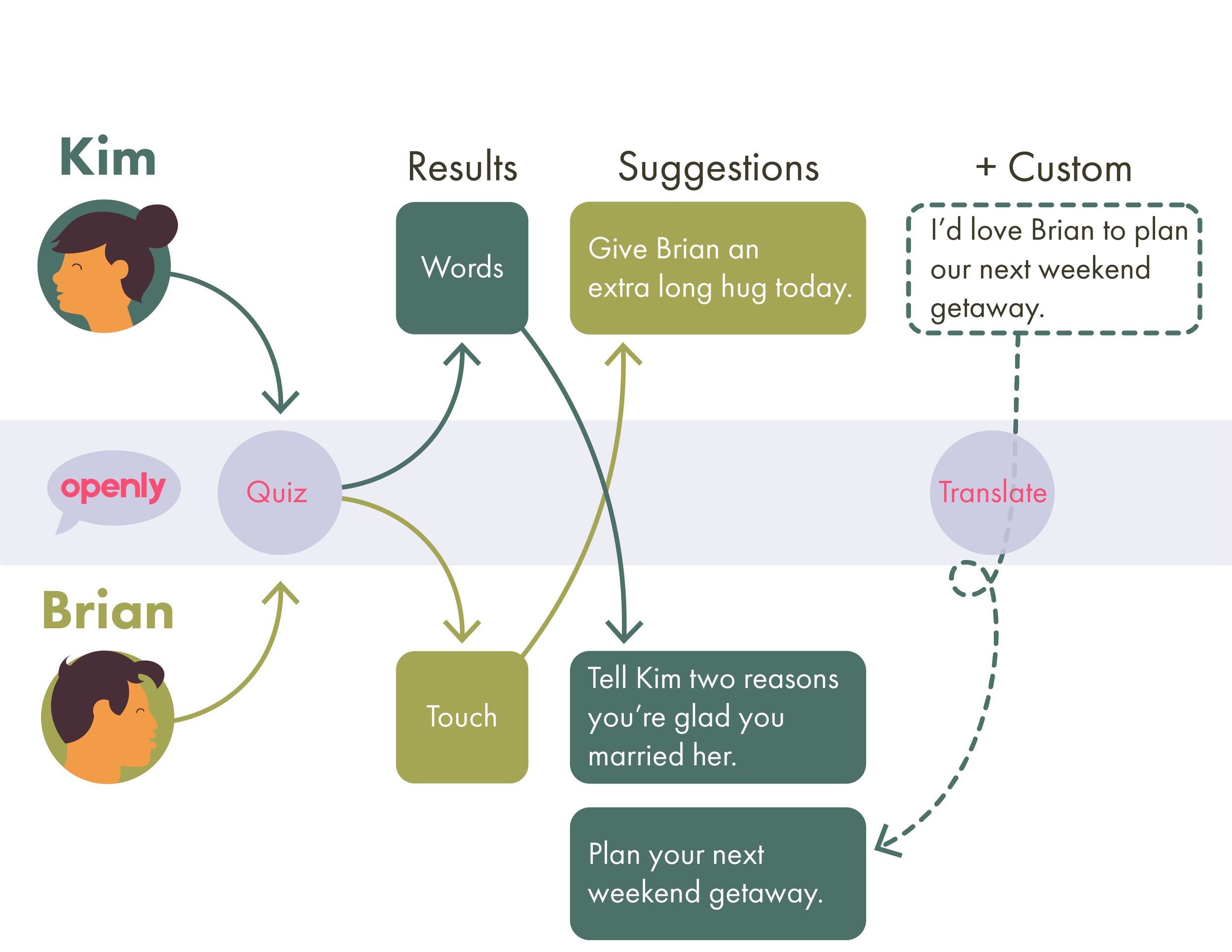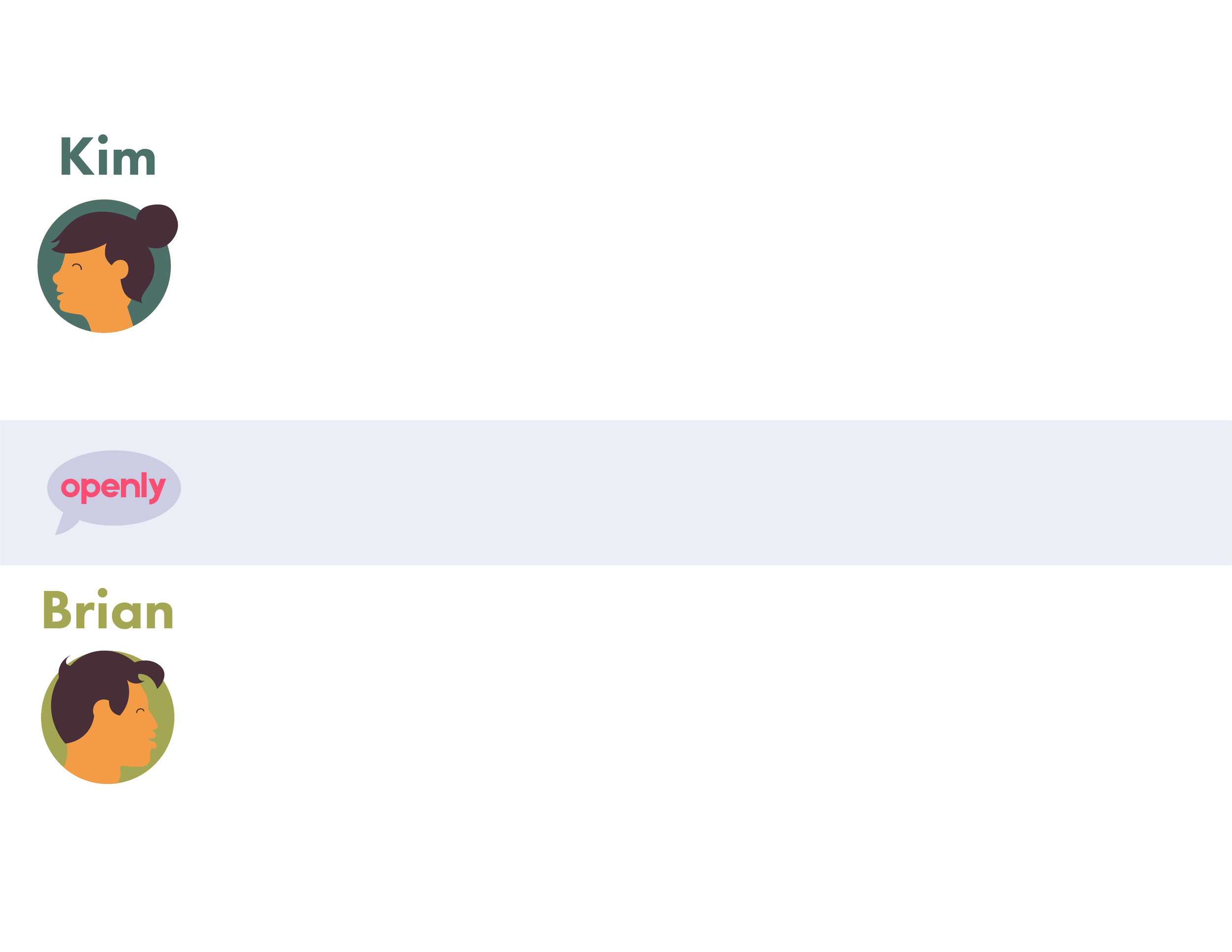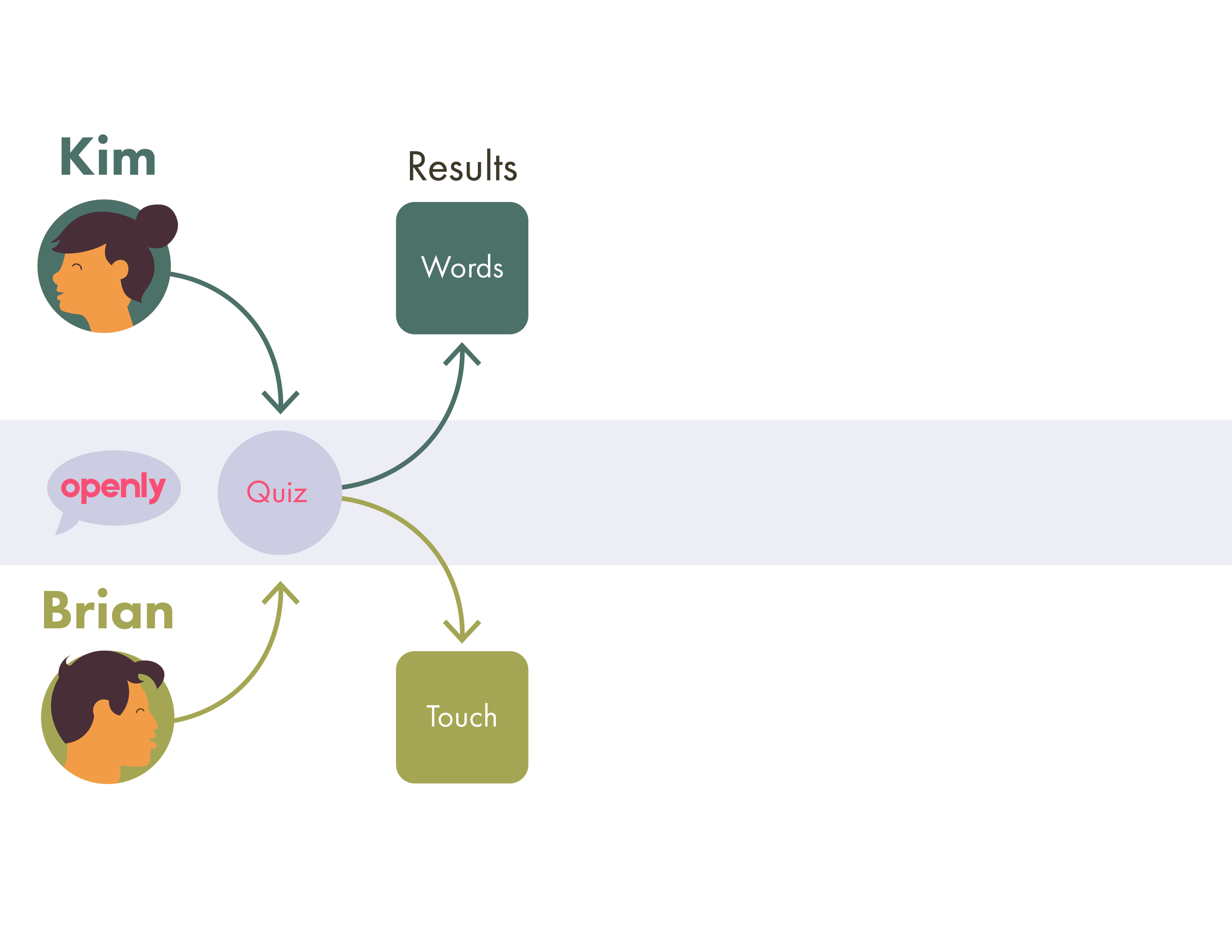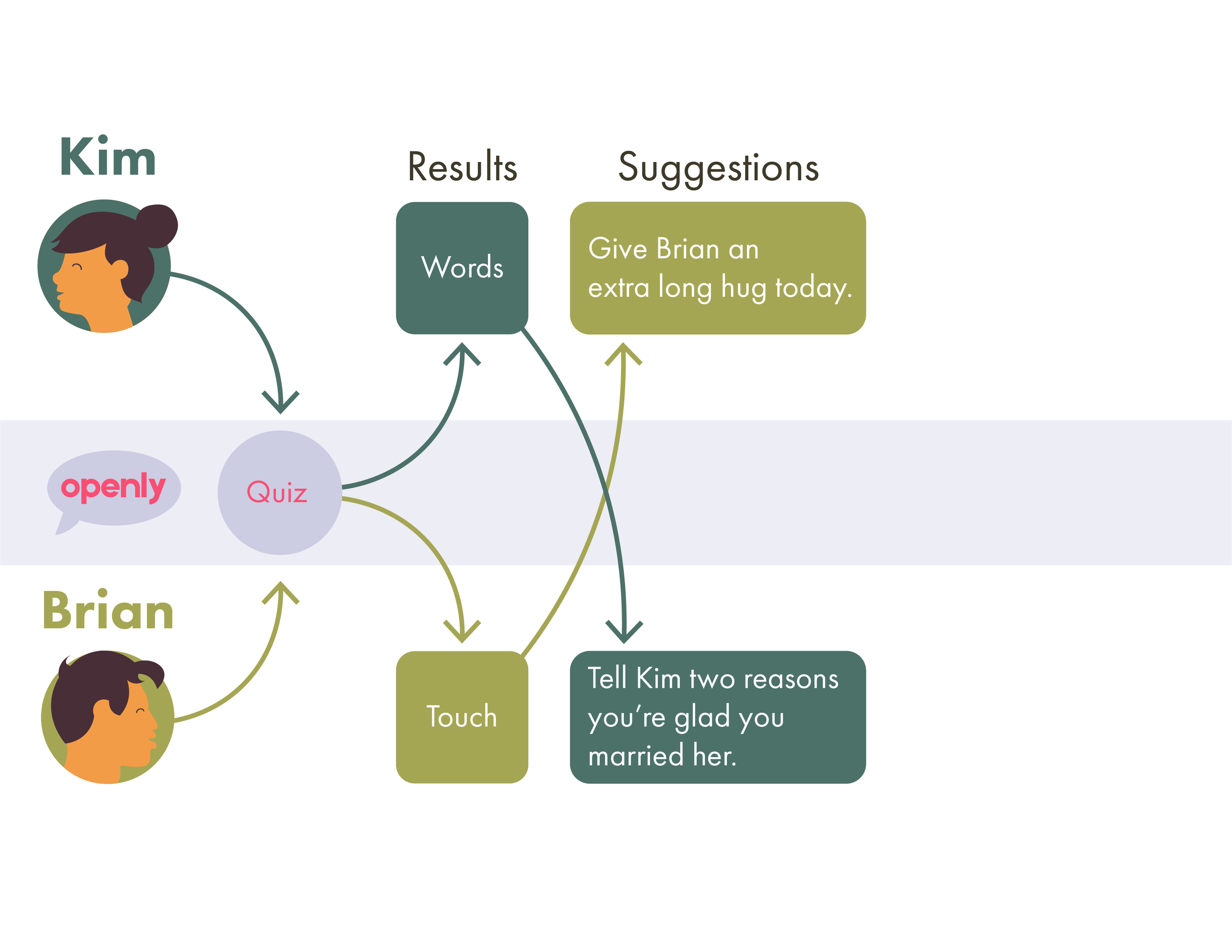Openly is an app that takes the guesswork out of showing you care.
Couples using Openly get do-able suggestions tailored to their partner's wishes. Openly learns about your personal preferences through quick personality tests and customizable suggestions.
Beginning at home
Openly came out of six months of work with Sophie Kwok at Austin Center for Design. We started our project in November by conducting design research with Asian Americans, in collaboration with Sarah Lum. We cooked with second generation Asian Americans in their homes, learned about their lives, and heard stories about their families through artifacts and listening to phone calls between themselves and their parents. Click through the images below to see some of what we experienced.
We heard stories that aren’t often spoken in our culture at large, or even within the families that bore them. Many of our participants thanked us for talking to them about their experience. Although some of them shared difficult stories of misunderstanding, isolation, and abuse, they aren't often able to talk about their lives honestly. We came away from our research with insights to guide us forward. We found that second generation Asian Americans:
Feel that they have no reason to speak up because their problems are incomparable to the trauma their parents went through.
Avoid confrontation because they fear losing control, but they’re losing more by not addressing their frustrations.
Our design needed to:
Build space for imperfection by creating tools to safely share shortcomings.
Teach methods to empathize & practice different ways love can be communicated.
Encourage personal acknowledgement that validates self-worth.
Our First Solution
The more we learned about relationships, and the more we user tested, the more it was clear that this app was not doing enough if it just encouraged people to face their problems indiscriminately. People testing the app wanted advice specific to each of their problems. With so many variables, our instruction sounded bland.
Pivot to Openly
Photo by Sarah Lum
When Sophie and I came back to school for our last quarter, we decided to look back at our research and look for a more specific kind of conflict. We found that many people we talked to had trouble asserting themselves in their romantic relationships, reformed our insights, and began ideating around improving communication in relationships. We didn’t want to lose that moment of validation we found with Elephant in the Room, and wanted to help both partners understand each other’s feelings and motivations.
We wanted our new focus to be more proactive than reactive; focusing on developing healthier relationships rather than trying to fix relationships. Even though we were focusing on romantic partners, we wanted to create a framework that users could translate into other aspects of their lives.
A love story
We all know that relationships are hard, but we all still have expectations for our partners and desires for our relationship. Often, those desires and expectations go unspoken. If we’re not open about what we want, it can lead to misunderstandings that leave both of us hurt or disappointed.
It’s vulnerable to talk about your expectations in a relationship. It can feel selfish to ask for what you really want. It’s much easier to assume you’re on the same page.
It can feel overwhelming to do something nice for your partner. You love them and they deserve the best! That’s a lot of pressure to put on yourself for big gestures.
We met Kim doing research. She's been married to her husband Brian for a little over a year. She told us that they argue a lot, mostly because he works long hours at as a restaurant manager, and she doesn't get to spend the time with him that she would like. Kim feels like she's nagging him all the time, and can't stop herself. She doesn't know what's going on inside his head. Kim and Brian were one of three couples that we tested with for a week.
How openly works
The first thing Kim and Brian did with Openly was take a quiz based on the Five Love Languages. We used an existing framework for this section because a lot of couples already understand Love Languages, or how they best feel loved. The five Languages are: Words of Affirmation, Quality Time, Physical Touch, Receiving Gifts, and Acts of Service. The idea is that way you feel loved may not match your partner, and you may sometimes have to translate your actions or partners to understand that you both care. Kim learned that she best understands love through Words, and Brian feels loved through Touch.
The Five Love Languages as they exist are a philosophy. They're advice; they don't tell you what to do on a daily basis. Openly gives users easy suggestions they can do any day to show their partner that they care. Below is a diagram illustrating how each user's Love Language influences the suggestions their partner gets:
This means that because Kim's result from the Love Languages quiz was Words, the majority of Brian's suggestions will be based on Words, even though that wasn't his result. About 20% will be random: pulling from other Love Languages for variety. The remaining percentage of results will come from suggestions that Kim requests herself.
Wireframes
Prototype
Click through the Openly prototype to view Kim's experience as she sets up her profile.
You can see how she connects to Brian, view both quizzes, see her add a request, and compare Kim and Brian's quiz results.
BE HERE
Most days, this is the section that users will look at to see their daily suggestions. During her first time through, Kim uses this section to connect to Brian and take the first quiz.
BE HEARD
Kim enters a custom suggestion for Brian to "plan a weekend getaway" that then shows up in the "My Ideas" section.
BE YOU
Kim can compare her Love Language to Brian's result, and can take the second quiz. The quizzes are really the brains of the app, that influence how we interact with each of the users. Read more about our quizzes here.
User Tests and opportunities
Kim and Brian looking over their personality types.
Kim and Brian were one of three couples that we tested with. We had each participant take a version of our quizzes, and sent them their results as well as their partner's. We texted daily suggestions, and asked them to reply with with their choice. They always had the option to skip. Most of our participants skipped one day, but did the rest.
We learned that this was a great challenge for couples. They loved getting new ideas and thinking about doing something for their partner everyday for a week, but it didn't quite feel sustainable. Most of our participants mentioned that they'd love to keep using it once or twice a week, or when they need more inspiration.
Eventually, we'd like to have expansion packs that couples can buy around a theme: new baby, moving in together, dates, sex... Each could come with a quiz about personal preferences. Right now, it would be obvious if someone suggested "Pick up Johnny from school today," that it didn't come from the Openly service, and that might feel like nagging. We'd love more ways to get around negative emotions that come with asking for what you want.
Everything we learned points to needing a greater understanding of user's motivations and how to nudge behavior change. I would love to test our theories on a large scale to see if we can really motivate people to change their behavior long term. And--even better--to feel good about that change.
Names of participants have been changed.
Update 2017: Sophie launched her startup Love Intently in January 2017 based on what we learned through Openly. You can now sign up to get Love Notes, relationship tips, and all kinds of Lovespiration through the Love Intently site. Hooray Sophie!


























